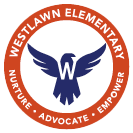2024-2025 School Innovation and Improvement Plan
Outcome goals for this academic school year
School Innovation and Improvement Plan at a Glance
2024-2025 | Westlawn Elementary | Region 2 | Christoph Hill, Principal
READING BY 3RD GRADE
Outcomes
- By Spring 2025, multilingual learners will increase EL progress by 5% (56.7%) as compared to 2024 (51.7%) as measured by WIDA.
- By Spring 2025, 3rd grade unadjusted SOL reading data will improve to 75% from 29%.
Strategies
- Leverage use of daily, explicit language comprehension lessons from the new core curriculum for building knowledge and vocabulary.
- Increase opportunities for English Language Development through use of new ESOL curriculum with intentional small group instruction focused on specific student needs.
ELEMENTARY SCHOOL MATH
Outcomes
- By Spring 2025, 4th grade unadjusted SOL math data will improve to 70% from 35% (3rd grade 23-24 Math SOL).
- By the end of SY 2024-2025 students in grades 1-6 will improve in all 4 math domains (Number & Operations, Algebra & Algebraic Thinking, Measurement & Data, Geometry) from 54% to 59% to meet typical growth and 22% to 27% to meet stretch growth as measured by the iReady math assessment.
Strategies
- Increase teacher's implementation of strategies and conversation structures that increase academic talk between students related to Shift 4: from show and tell to share and compare.
- Increase teacher implementation of explicit instruction and other components of effective mathematics intervention.
- Increase students' self-efficacy around the ability to be successful in mathematics.
SCIENCE
Outcomes
- By June 2025, 5th grade students will increase their pass rates on the Science SOL from 32.6% unadjusted to at least 70% unadjusted as measured by the Science SOL.
Strategies
- Increase opportunities to apply and demonstrate understanding of vocabulary through evidence-based arguments and reasoning.
- Expand opportunities to meaningfully integrate science within and across content areas to include literacy skills, mathematical reasoning, and global context.
SOCIO-EMOTIONAL LEARNING & WELLNESS
Outcomes
- By June 2026, in an effort to increase student access to instruction, behavior referrals will reduce by 50% (from 40 to 20) as measured by office discipline referrals.
Strategies
- Identified time in the master schedule is used to implement required SEL practices with fidelity to improve student perceptions of belonging and SEL skills. (MM & CC- ES or RAM- MS/HS, 3 Signature Practices- All).
- All school administrators and staff regularly model social and emotional competencies in their interactions with others, to include interactions with students, families, and one another.

